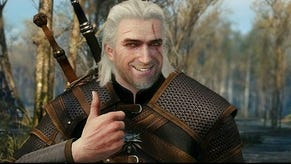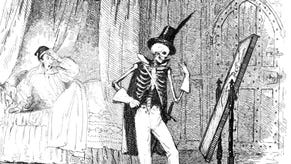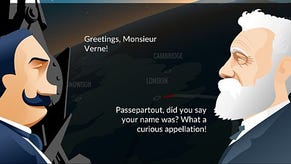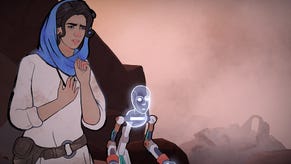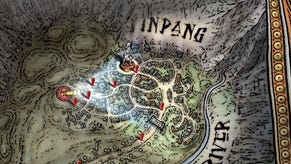One Night With 80 Days
Cold comfort
Inkle's 80 Days [official site] was one of my favourite games of 2014 and if it had been released on PC, I'd have spent hours and hours writing about it on this here site. Last week I was moving house, a task I always find daunting even though I've rarely settled in one place for longer than a year. I'd installed the newly released PC version of 80 Days before the move and while waiting for my new broadband installation, I've been free of internet distractions and so found myself loading up Fogg's adventures at 3am on a sleepless night.
I love the game as much as I did when I first played it. As well as brilliantly retelling Jules Verne's classic through hundreds of optional and intertwined encounters, its locations and their inhabitants are a constant source of delight. It is, wonderfully, a game concerned with progress and progressive thinking. The journey itself is at the heart of that but Inkle repeatedly confound my expectations with the humane and empathetic depiction of the many cultures and people of the world.
It is one of the kindest and most thoughtful games I've ever played, and while that might make it sound soft and fluffy, it's anything but. 80 Days is subversive, hard and haunting, but it always treats its cast with respect.
[there are spoilers coming up - not in the next paragraph but I'm warning ahead of time so you don't accidentally see a certain phrase right after the next image]
On top of everything else, it's a game about storytelling. Passepartout's narration traces the changes he goes through during the adventure and his realisation that the tale he is recording isn't what he had had initially thought is beautifully delivered, step by step along the way, and the end of each journey is packed with meaning. There's one particular ending that I hadn't discovered, however, until that night last week. It involves a diversion and it's one of my favourite sequences in any game.
The spoilers are just beyond this next image.
Fogg can die on the quest for the North Pole. I'm calling it a 'quest' because it's the first and only time I've seen Passepartout's master possessed of a sense of urgency about anything other than the task at hand. As soon as you make the turn toward the Pole, which is clearly an unnecessary and time-wasting diversion at best, the narration shifts subtly. Fogg is in charge now - there are no harrumphs or tsks as you select the next destination and risk failure because you are losing agency.
As soon as you board the Ice Walker, a startling vehicle that strides and clambers across the ice like a giant mechanical insect, there is no turning back. You didn't choose this particular fork in the path, Fogg chose it and he is gripped by a desire to see whatever is hidden at the Pole.
Because he is such a passive character in all other situations, an entirely unadventurous adventurer, Fogg's sudden excitement and the strength of his will are shocking. This, I came to understand, has always been his dream - not riches, not a genteel life, not an idle wager, but a true sense of discovery. Perhaps even solitude; his journey not a round trip but a search for solitude, away from the distractions of the familiar.
This is just one possible Fogg. He is also, but not simultaneously, the gentleman of Verne's story. In some of 80 Days' many possible tales he is cold and even somewhat cruel, in others there is a warmth that bubbles beneath the surface. This Fogg was determined, unnervingly so, and at the end he was vulnerable, open and generous.
It is, as far as I know, the only path in the game that can lead to his death. There is an accident and in the aftermath, I tried to keep him warm as he faded. It is possible to survive, I hear, if Passepartout and Fogg have a strong relationship and have befriended the crew of the Ice Walker. We had not - or if we had, we squandered whatever hope we might have had by making poor decisions as we lay in the frozen forever.
When Fogg perishes, after what seems like an hour of agonised waiting and possible revivals, he expresses his love for Passepartout. Given that his only other acknowledgement of any form of bond between them is usually a nod or a curt statement of gratitude, I found that final moment incredibly touching. It's capped by Passepartout's announcement that his journey will continue but that he will not record it.
Whatever is to happen next, now that he is alone and his own man once again, it is not for our eyes.
I found the entire story very moving but the gradual surrender of control sticks with me more than the overtly emotive qualities. 80 Days is a game about decisions and in the cold, those decisions are stripped away. First, Fogg takes command of the expedition, seemingly having no need for his valet's guidance. Then, as he lies in the snow, Passepartout ceases to be an avatar and becomes an independent character. In choosing not to write anymore, he severs his connection with us, as audience and controller, and goes forward alone.
It's just one of the many intelligent and emotional moments in the game. Most games would be happy to have an ending so powerful - 80 Days is made up of hundreds of endings, some more final than others, and I've enjoyed every one that I've experienced. I want to see them all.




